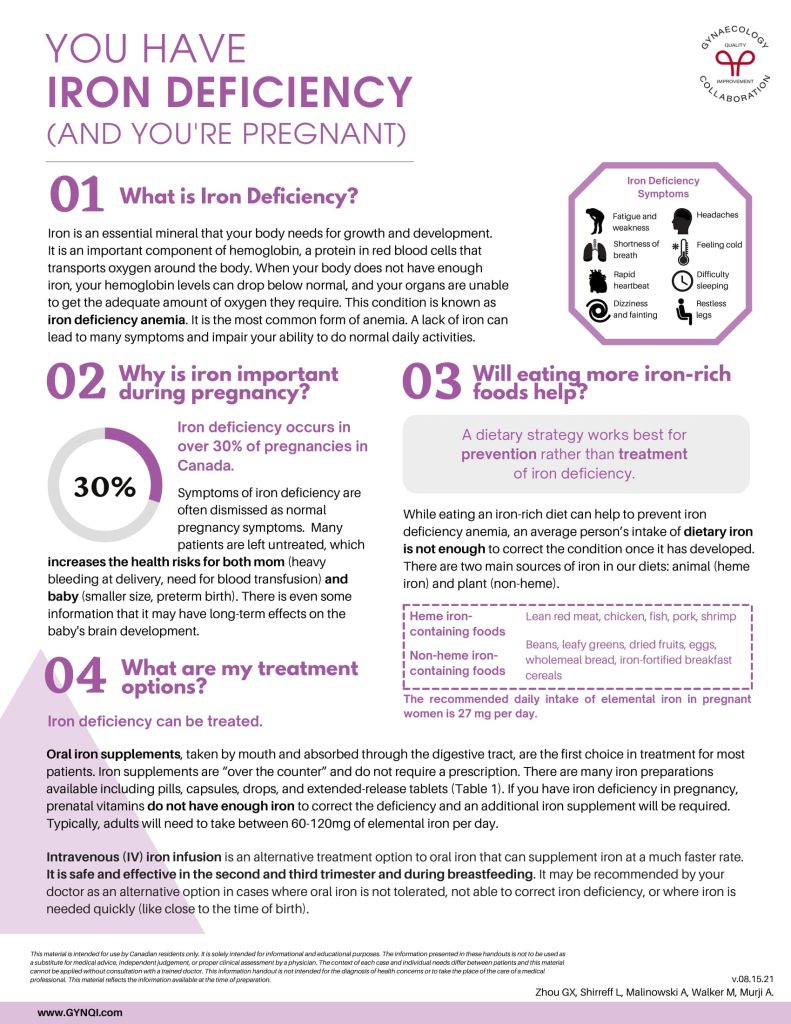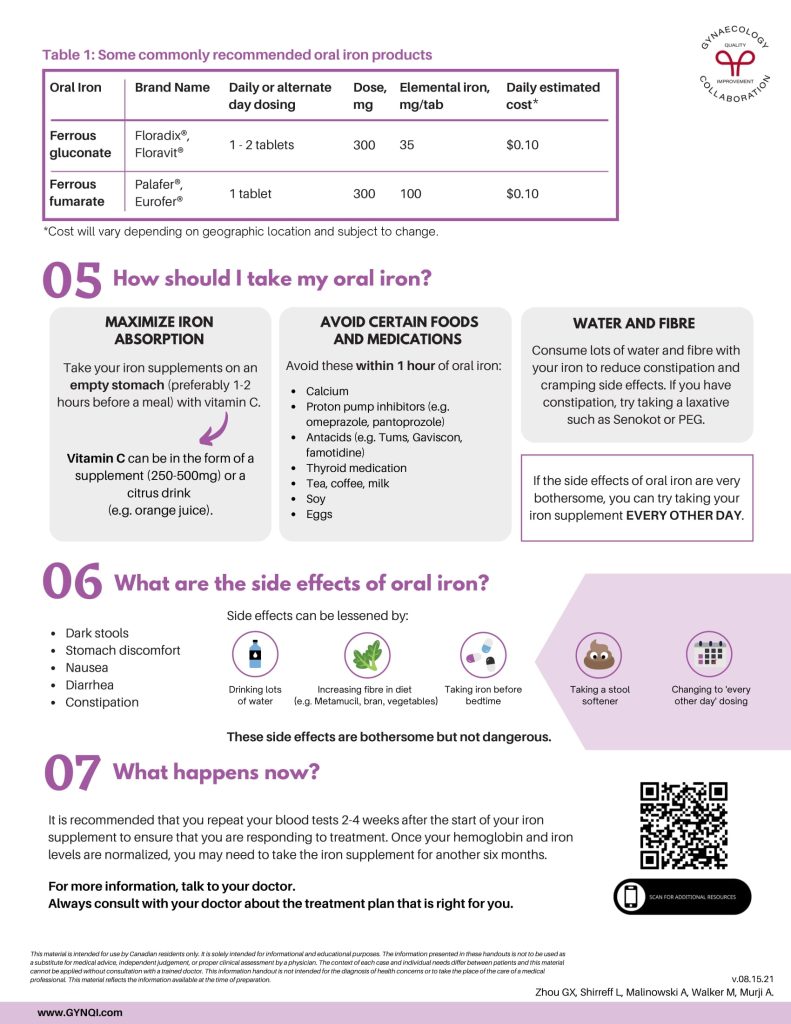

Table of Contents
- Summary
- What is Iron Deficiency?
- Iron Deficiency Symptoms
- Why is Iron Important During Pregnancy?
- What Are My Treatment Options?
- Oral Iron Supplements
- Intravenous (IV) Iron Infusion
- How Should I Take My Oral Iron?
- Will Eating More Iron-Rich Foods Help?
- What Are the Side Effects of Oral Iron?
- What Happens Next?
- Take Action for a Healthier Pregnancy
Summary:
- Iron deficiency occurs when your body lacks enough iron to produce hemoglobin, a protein in red blood cells that transports oxygen to organs, leading to symptoms like fatigue and dizziness.
- Iron deficiency is common during pregnancy, with over 30% of pregnant women in Canada affected, yet many go untreated, raising health risks for both mom and baby.
- Treatment options include oral iron supplements and intravenous infusions, with supplements taken alongside vitamin C to improve absorption.
- Eating an iron-rich diet, including sources like lean red meat, chicken, and leafy greens, helps prevent iron deficiency anemia, but is typically not enough to treat the condition once it has developed.
Iron deficiency anemia is a condition that’s more common than you might think. Iron is a vital mineral for your body, particularly during pregnancy, as it supports the development of red blood cells and ensures your organs receive enough oxygen. When iron levels drop, this can lead to iron deficiency anemia, a condition that brings fatigue, dizziness, and other disruptive symptoms. Understanding this diagnosis and how to manage it is crucial to both your well-being and your baby’s health.
What is Iron Deficiency?
So you have iron deficiency, and you’re pregnant.
Iron is an essential mineral that your body needs for growth and development. It is an important component of hemoglobin, a protein in red blood cells that transports oxygen around the body. When your body does not have enough iron, your hemoglobin levels can drop below normal, and your organs are unable to get the adequate amount of oxygen they require.
This condition is known as iron deficiency anemia and is the most common form of anemia. A lack of iron can lead to many symptoms and impair your ability to do normal daily activities.
Iron Deficiency Symptoms
Iron deficiency can cause a range of symptoms, including:
- Fatigue and weakness
- Shortness of breath
- Rapid heartbeat
- Dizziness and fainting
- Headaches
- Feeling cold
- Difficulty sleeping
- Restless legs
Why is Iron Important During Pregnancy?
Iron deficiency occurs in over 30% of pregnancies in Canada, yet its symptoms are often dismissed. As a result, many women remain untreated, increasing health risks during pregnancy.
For mom, iron deficiency can include heavy bleeding at delivery and the need for a blood transfusion.
For baby, the potential of a preterm birth and being born a smaller size can be associated with iron deficiency.
There is even some information that iron deficiency anemia can have long-term effects on the baby’s brain development.
What Are My Treatment Options?
The good news is Iron deficiency can be treated. Both oral supplements and intravenous infusions are effective treatments to combat deficiency.
If you have iron deficiency in pregnancy, prenatal vitamins do not have enough iron to correct the deficiency and an additional iron supplement will be required. Typically, adults will need to take between 60-120mg of elemental iron per day
Oral Iron Supplements
Taken by mouth and absorbed through the digestive tract, oral supplements are the first choice in treatment for most patients. Iron supplements are over-the-counter and do not require a prescription.
There are many iron preparations available including:
- Pills
- Capsules
- Drops
- Extended-release tablets
Some commonly recommended oral iron products include:
The cost of these treatments will vary depending on your geographic location and are subject to change.
Intravenous (IV) Iron Infusion
IV iron infusions are an alternative treatment option to oral iron supplements. IV infusions can supplement iron at a much faster rate and are safe and effective in the second and third trimesters and during breastfeeding.
This form of treatment may be recommended by your doctor as an alternative option in cases where oral iron is not tolerated, is not able to correct the iron deficiency, or where iron is needed quickly such as close to the time of birth.
How Should I Take My Oral Iron?
There are a few things to consider when taking iron supplements.
To maximize iron absorption, take supplements on an empty stomach (preferably one to two hours before a meal), and with vitamin C. Vitamin C can be in the form of a supplement (250-500mg dose) or a citrus drink such as orange juice.
Avoid these within one hour of taking oral iron:
- Calcium
- Proton pump inhibitors (e.g. omeprazole, pantoprozole)
- Antacids (e.g. Tums, Gaviscon, famotidine)
- Thyroid medication
- Tea
- Coffee
- Milk
- Soy
- Eggs
Be sure to consume lots of water and fibre with your iron to reduce constipation and cramping side effects. If you have constipation, try taking a laxative such as Senokot or PEG.
If the side effects of oral iron are very bothersome, you can try taking your iron supplement every other day.
Will Eating More Iron-Rich Foods Help?
While eating an iron-rich diet can help to prevent iron deficiency anemia, an average person’s intake of dietary iron is not enough to correct the condition once it has developed. The recommended daily intake of elemental iron in pregnant women is 27mg per day.
There are two main sources of iron in our diets: animal (heme iron) and plant (non-heme).
Animal (heme iron): Lean red meat, chicken, fish, pork, and shrimp-containing foods.
Plant (non-heme iron): Beans, leafy greens, dried fruits, eggs, wholemeal bread, and iron-fortified breakfast cereals.
A dietary strategy works best for prevention rather than treatment of iron deficiency.
What Are the Side Effects of Oral Iron?
Oral iron supplements, while effective in treating iron deficiency, can cause a variety of side effects. These side effects are bothersome but not dangerous, and include:
- Dark stools
- Stomach discomfort
- Nausea
- Diarrhea
- Constipation
Side effects can be lessened by:
- Drinking lots of water
- Increasing fibre in the diet (e.g. Metamucil, bran, vegetables)
- Taking iron before bedtime
- Taking a stool softener
- Changing to ‘every other day’ dosing
What Happens Next?
It is recommended that you repeat your blood tests two to four weeks after the start of your iron supplement to ensure that you are responding to treatment. Once your hemoglobin and iron levels are normalized, you may need to continue taking the iron supplement for another six months.
Take Action for a Healthier Pregnancy
Iron deficiency anemia is a common but treatable condition, especially during pregnancy when your body’s need for iron increases. If left untreated, it can pose risks to both you and your baby. Fortunately, with the right treatment plan—whether through oral supplements or IV infusions—iron levels can be restored, allowing for a healthier pregnancy and a safer delivery.
Stay proactive, follow your doctor’s guidance, and trust that with each step, you’re supporting your body and your baby’s future well-being.



